‘You Murderer!’ – Duch Tells About Arrests Within the Party
Kaing Guek Eav, alias Duch, went through another intense day of questioning. The witness was reminded a couple of times that he needed to answer questions in a concise way, as he had the tendency to flood essential information with other comments. Senior Assistant Prosecutor Dale Lysak asked for more time today, and he was successful in tying Duch’s orders to Son Sen as well as Nuon Chea on multiple occasions. Judge and President of the Court Nil Nonn asked the witness a few follow-up questions, and Judge Jean-Marc Lavergne concluded the day by a conscientious inquisition.
Statements under torture
Senior Assistant Prosecutor Dale Lysak only had the time to utter half a question before he sat again. Co-Counsel for the Defense of Khieu Samphan Anta Guissé referred to a document quoted by Mr. Lysak yesterday, which dealt with Khieu Samphan participating in the meeting where decision was made to arrest the West Zone secretary Chu Chet, alias Si[1]. The issue here was where the quote came from: a confession of Pang while he was at S-21. As explained yesterday by the Judges, there is a presumption that any statement from a confession of an S-21 prisoner was obtained under torture and therefore cannot be used in a procedure in front of this Court. Ms. Guissé reiterated that the burden of proof was on the Prosecution: it had to be shown that the quote did not come from a confession. Mr. Lysak denied the quote he extracted was tainted by the presumption of torture, and had Duch affirm that the excerpt was from a separate conversation with Pang.
Mr. Lysak’s next questions hinged on three documents: was Khieu Samphan aware that leaders, cadres were being arrested and was it well known? [2] [3] Co-Lawyer for Khieu Samphan Kong Sam Onn objected to this question: “to seek a comment by a witness, has to be within his/her knowledge.” President of the Court Nil Nonn asked the Prosecution to change the wording of his question, but Duch was only able to say that they sometimes knew, though officially, details about arrests were not to be divulged. Duch did not believe that Khieu Samphan was not aware of the arrest: “I believe he is not courageous”.
“Mr Witness, did you ever hear of Khieu Samphan, Brother Hem, reading from S-21 confessions at education sessions or party meetings?”
“No.”[4]
Delving into the purges of cadres within the regime, the Prosecution sought to discover if this practice was well-known among the party members[5]. Duch told him that all the cadres arrested at that time were sent and executed at S-21 and mentioned small meetings with only a selected number of cadres. Duch acknowledged that during a meeting in January 1979, Khieu Samphan had said that everyone should concentrate on their tasks and that “the situation was normal”. According to the witness, he had not mentioned the military situation.
The focus of Mr. Lysak helped illustrating the strong climate of suspicion that reigned in the chain of command of the party.
The Senior Assistant Prosecutor pushed to know more about the purges: who made the decisions to arrest the leaders? The witness answered that he and Hor needed authorization from the upper echelon and that he himself could not make arrests. For example, Nuon Chea had decided on the arrest of Huy Sre, former Head of Prey Sar and was generally the one who gave execution orders to the witness[6], except when it was Son Sen[7]. If any head of security made an arrest without authorization, he said “they were arrested and killed.”
Duch gave lengthy answers which went well beyond the Senior Assistant Prosecutor’s questions.
Disassembling the chain of command
Asked about some annotations handwritten by him, Duch said he only “followed orders”[8]. Like yesterday, Mr. Lysak had the witness look at documents that implied the use of previous confessions incriminating higher ranked party members during interrogations. Duch confirmed this, as well as the fact that in at least one instance, Nuon Chea advised him to withdraw the names from a list because he did not want them to be aware that their names were implicated. They were going to be arrested.[9] [10] Mr. Lysak then went on:
“Did Nuon Chea give you instructions relating to prisoners from the East Zone?”
“The prisoners sent from the east into S-21 were interrogated by S-21, he did not instruct anything more, he was waiting for the confessions. […] At S-21, when members of a specific zone were arrested in mass, I was instructed to smash the prisoners who were detained at S-21 to make space for the newcomers. […] After the arrest of Brother Pum, there were mass arrivals of prisoners. 20-30 people sent on one morning.”
Duch recalled that at some point, about 300 prisoners were sent to Choeung Ek, one of the killing fields, at once[11]. Some arrived from the East Zone and stayed only a day at S-21 before being sent to execution without being interrogated.
Moving on to a political education session in October 1978 led by Pol Pot, Mr. Lysak asked Duch if Pol Pot had given any specific instructions. The witness mentioned a circular that was issued saying that some prisoners who had confessed to being C.I.A would be pardoned, and that interrogations were to be stopped. Duch remembered saying to Nuon Chea:
“What should I do with the rest of the prisoners?”,
to which Brother Nuon answered:
“Brother Duch, you are [in line] with the Party!”
Based on this, Duch said he resumed the interrogations.
Notes from Tuy or Pon of October 8, 1978 were shown to the witness that mentioned that the interrogations of Khmer prisoners should be conducted “without beatings and getting 80 percent confessions”, “no beatings and getting very detailed confessions 70 percent”, and with “absolute special branch methods completely and totally permanently” for foreigners (“the Yuon” and “the imperialist C.I.A”). Mr. Lysak inquired whether these instructions written down in this note were conveyed by Duch to his interrogators and based on instructions the witness had received during the meeting with Pol Pot and other cadres previously mentioned. The witness confirmed that what he told his interrogators was taken from the education sessions led by Pol Pot.[12] In contrast to the Khmer, whose confessions could be obtained without beating “to 70 percent”, “the Yuon, the C.I.A had to be beaten”.
Continuing on the interrogation of the cadres, notably right after one of the meetings, the Prosecution then asked the witness about the interrogation of Deputy Prime Minister Vorn Vet. Duch said that Comrade Lin arrested him at the Party Center after the end of a meeting on November 2, 1978. According to Duch, he assigned Pon to interrogate and torture Vorn Vet by spraying him with cold water with ice and turning a fan towards him so he would “shiver”[13].
“And before I approached [Vorn Vet], he shouted at me:
“You murderer!”
Vorn Vet was the one who introduced Duch to the Party.
Interrogation and torture of important prisoners
Mr. Lysak inquired if torturing important prisoners, such as Vorn Vet, meant that Duch or anyone in a similar rank needed authorization. The witness said that both Nuon Chea and Son Sen, alias Brother Khieu, gave instructions, tying them to the acts of torturing the cadres of the party.
“Pol Pot was a paranoid person.”, Duch said.
According to the witness, he would not do anything that was not an order from Nuon Chea or Son Sen[14] when it came to interrogating important prisoners, though sometimes Nuon Chea would let them proceed as they usually did without “poking his [nose] deep into the business of S-21”.
“One must not forget that Nuon Chea was following this closely and needed a full confession. Although I respected Son Sen and Vorn Vet, I feared Nuon Chea.”[15]
The interrogation technique specific to cadres was further elaborated by the witness. They would use testimonies that incriminated them in order to threaten the cadres being interrogated, a process that was referred to as “making a whole in their side”[16].
A photograph of Koy Thuon was then displayed on the screens: he was sitting in one of the cells in S-21, confirmed Duch[17]. He said that Son Sen had left for the battlefield in August 1977, which is when Duch started working for Nuon Chea at S-21.
Mr. Lysak relied on records of radio broadcasts and two of the interrogators’ notebooks to assert that troops were sent to fight the Vietnamese around November or December 1977, suggesting Son Sen was still in Phnom Penh until then[18]. Duch remarked he “never saw Son Sen’s face after August 1977. We did communicate by radio.” In 1978, a prisoner implicated Son Sen, and Duch said in a 1999 interview that he referred to Nuon Chea (which he confirmed today) for instructions before coming to the conclusion that:
“I realized that S-21 was not a tool to look for the truth but a tool to smash others for themselves. It was wrong, I did it, I was wrong, I violated the truth.” [19]
Mr. Dale Lysak came to the end of his thorough interrogation of the witness. He listed all the high ranked figures that had been arrested: Son Sen, Vorn Vet, leaders of almost every zone, leaders of many military divisions. Concluding with vigor, the Senior Assistant Prosecutor asked:
“They were accused of being traitors, brought to S-21 and killed. Mr. Witness, how do you think it was possible for the CPK to have a successful revolution if all along, half of the Central Committee and leaders were traitors? Did that occur to anyone? Did they ever raise that issue with you?”
“No.”
President of Tribunal Nil Nonn requests clarifications
President Nil Nonn had noticed the witness remembered certain names and certain dates with great precision.
“Mr. Witness, you said that Son Sen left on August 15, 1977. Can you recall if there was any specific events that led you to remember such a specific date?”
“I recall it because it is important for me. I was going to work under Brother Number Two who lowered his position to work with me, that [stuck] to my mind.”
Next, the witness was asked to cover more details about the chain of command. In the case of North Zone commander Koy Thuon being arrested and detained, the President asked how Duch knew the order came from Pol Pot, to which the witness answered that Son Sen had conveyed the order[20] and that he was detained at the party’s office. Mr. Nil Nonn then wanted to focus on the interactions of the witness with Nuon Chea. According to Duch, he saw him on many occasions, “once every three or four days”.
Duch then confirmed that he knew previous confessions were used to implicate members of the Party, who would then be sent to S-21. He specified that Son Sen, Brother Khieu, was in charge of circulating the confessions before interrogations as well as in different zones. He was the one who made many annotations as well.
The president concluded this session by asking:
“The chamber has heard evidence in relation to a meeting help in Phnom Penh on May 20, 1975 at the National Stadium, did you attend it?”
“I was at Amleang at that time, not aware of what was happening in Phnom Penh.”
Additional interrogation techniques: threats and intimidation
Dun, chairman of Committee 870, was arrested and sent to S-21 in 1977, as the witness recalled. He only knew that whoever ordered his arrest was from the upper echelon, Committee 870. Duch then explained a code name he used with Pon to say that a prisoner was lying in his interrogation[21].
A letter from Pon illustrated the intimidation method used to interrogate Dun:
“Monsieur Dun, I would live to give you the following reminders. The text that you wrote and that you are writing now is about other person’s stories, no factual events that the story of your own involvement in the Party. According to the policy of the Ministry of Santebal, your ankle tendons will be pierced if you remain obstinate.”
Duch explained that “Monsieur” was a degrading way to address someone on Khmer, most likely linked to the animosity of the CPK to the imperialist nations. The witness assured the Court that the threats were only “warnings” that were not carried out in reality[22]. The interrogator Pon was trained by the witness. At S-21, he assigned him to interrogate important prisoners and always got results without beating them, Duch said.
Tainted with torture
As Mr. Nonn cited a document in which Dun says to Duch that he had “no words” to describe his suffering from the torture he was submitted to[23]. Ms. Anta Guissé, Co-Lawyer for the Defense of Khieu Samphan, did not miss a word of it and objected to the use of the letter, which she said was tainted by torture. Mr. Lysak, involved in the debate over this issue yesterday as well as this morning, rose and said, visibly frustrated that this dispute was still not closed:
“Here, the point is to show that there was torture. The Convention against Torture cannot prohibit [a statement that asserts there was torture]. It cannot possibly the case. If it were the case, up is down and down is up.”
Ms. Guissé argued back, saying that the fact that there was torture was already known to the Parties. She clearly drew the line between annotations, which were authorized, and the content of statements made by someone submitted to torture. She did so relying on the decision made by the Judges yesterday.
The president abandoned his quote, and gave the floor to Judge Jean-Marc Lavergne, who signaled he had a few questions to ask the witness.
Judge Lavergne: ranking orders within the Regime
Judge Jean-Marc Lavergne grilled the witness in detail, asking first when Ta Nat was transferred from S-21 to the Central Party. Son Sen spoke in the name of Committee 870. Duch answered that he finished his remaining activities at S-21 around June 1976[24].
Nat had been transferred to the Ministry of Foreign affairs. Judge Lavergne inquired as to why this transfer was considered a negative and punitive measure? Duch confirmed it was, but did not elaborate on the reason why. Nat was imprisoned at S-21, shortly before the Vietnamese troops arrived.
“Mr. Witness, was there an order to kill Nat and if so, who issued it?”
“He wasn’t kept long so that we could obtain sufficient information; he was then sent away to be smashed.”
He specified that important people were executed close to a pond, in the area of Street 63 and Mao Tse Toung Boulevard. The locations Duch uttered were familiar to people living in Phnom Penh, which chilled the audience.
Duch at S-21
Duch recalled he was appointed Secretary for the S-21 Committee as well as Head of the Prison in March 1976, after Nat was transferred. His Deputy Secretary was Hor, and Huy Sre was a member – they were both part of Division 703, from where many S-21 prisoners came from. Judge Lavergne then inquired about Hor and Huy’s other responsibilities. The witness answered that Huy was supervising rice farming at Prey Sar and Hor supervised Phnom Penh and Choeung Ek, one of the killing fields for prisoners.
Huy was arrested and executed, but not Hor. Judge Lavergne asked the witness if he knew why, and Duch answered that Huy did not do his work as well as Hor, reiterating that any decision to arrest someone was left to the upper echelon.
“I was terrified because usually we did not allow other cadres [from Hanoi in this case] to see the confessions of enemies.”
“Mr. Witness, when you saw the importance of the role of Pang (he could see the confessions), did you
think Pang was part of the Santebal? [Special Branch of the Khmer Rouge regime in charge of internal security and running prison camps like Tuol Sleng (S-21)]”
“I learned that Pang was a member of the associates of the Center, so I started to respect him as he could carry the instructions of Pol Pot to S-21.”
Duch knew at the time that Pang was the spokesperson and chief of the guard’s unit of Pol Pot, and he found out later he was the chief ministry of S-71. Pang brought people to Duch for at S-21.
The witness could not recall more details about Pang and his alleged involvement in bringing people from the Ministry of Foreign Affairs, foreigners or Khmer expatriates to S-21or other activities in the country.[25] Judge Lavergne was likely trying to assert whether the cadre in question was using his functions in the Ministry to bring prisoners to S-21. When Pang was arrested later on, Lim Khan alias Ken or Kein (from Division 180), replaced him. Duch was not aware that Pang have any connection to Ieng Sary, which Judge Lavergne wanted to know.
After a slight confusion in the last exchange between the Judge and the witness, the President adjourned the hearing. The hearing of Kaing Guek Eav, alias Duch, will resume on June 15, 2016 at 9 am.
[1] E3/347, at 00184998 (EN).
[2] E3/203, at 00385413-14 (KH), 00424016 (EN), 00434236-237 (FR). E3/3169, 00711413 (KH), 00002771 (EN), 00722090 (FR).
[3] Khieu Samphan denied he knew about arrests during the regime. 14/12/2007, E3/37, at 00156675 (KH), 00156753 (EN), 00156680 (FR).
[4] E3/1684, at 00192046 (KH), 00192873 (EN). Voices from S-21, David Chandler, Footnote 47, a bodyguard of a cadre saying that he had heard Khieu Samphan read some at a session.
[5] E3/727, at 00064566 (KH), 00185333 (EN), 00524460 (FR).
[6] E3/3694. E3/10376.
[7] E3/9905, at 01011302 (KH), numbers 12 to 14. Medics at S-21.
[8] E3/1688.
[9] E1/54.1, 10h26-29.
[10] OCIJ list. 170 secretary Sok Kae Son, alias Sok 2969 OCIJ list, arrested and executed. His wife and sons were sent to S-21 later and executed, 10758, 10753, 10754. Sector 23 secretary So 5099 OCIJ list. Wife S-21 executed, 9065. Son 9074. Daughter 9067.
[11] E3/8463: list of prisoners executed, at 00016039-74 (KH).
[12] E3/834, at 00077518 (KH), 00184522 (EN).
[13] E3/347, 4-6/05/1999. At 001160905 (KH), 00185026 (EN), 00160948-49 (FR).
[14] E3/5771, at 00185492 (KH), 00185500-01 (EN), 001855809 (FR).
[15] E3/106, at 00177627 (KH), 177637 (EN), 00177648 (FR).
[16] E3/1604, at 00006159 (KH), 00769831 (EN), 00766795 (FR). Interrogation of Koy Thuon. 000067557 (KH), 00773088 (EN), 00965892 (FR).
[17] E3/2360.
[18] E3/833, at 00077826 (KH), 00184592 (EN). E3/834, at 00077447 (KH), 77456 (EN), 00184483-488 (FR).
[19] E3/347, at 00160918 (KH), 00185050 (EN), 00160970 (FR).
[20] Testimony in Case 001. 00792500 (KH), 00793703 (EN).
[21] E3/1625, at 00011608 (KH), 00768020 (EN). Annotation from 1977: “he should stop lying, he had something to hide, “covering his own feces”.”
[22] 0001629 (KH), 0076820 (EN).
[23] E3/1625, at 0011671 (KH), 0076823 (EN).
[24] E3/235, at 00183419 (FR), 00322971 (EN), 00019146 (KH).
[25] Testimony from 24/04/2012, E3/67.1

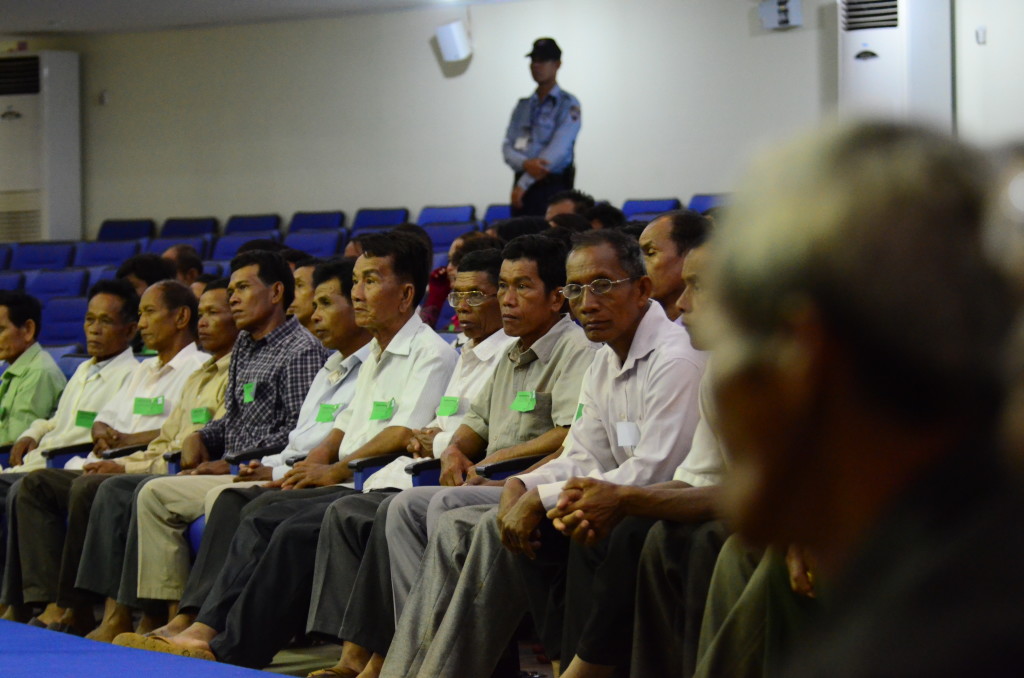
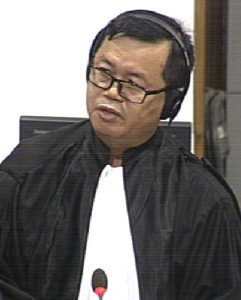
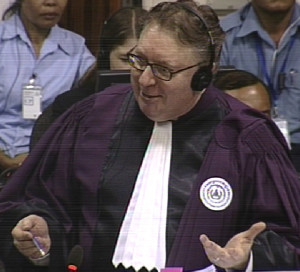
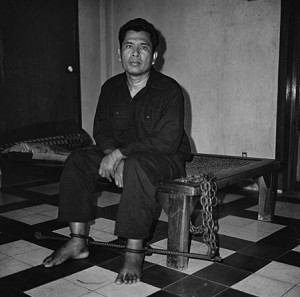
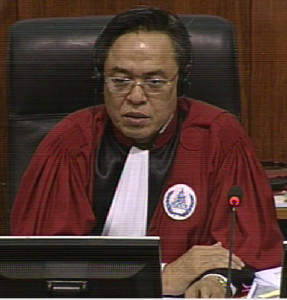
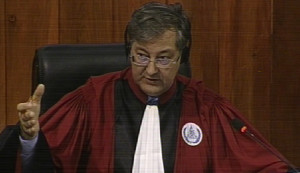
[…] “You Murderer!” – Duch Tells About Arrests Within the Party, The Cambodia Tribunal Monitor, Ju… […]